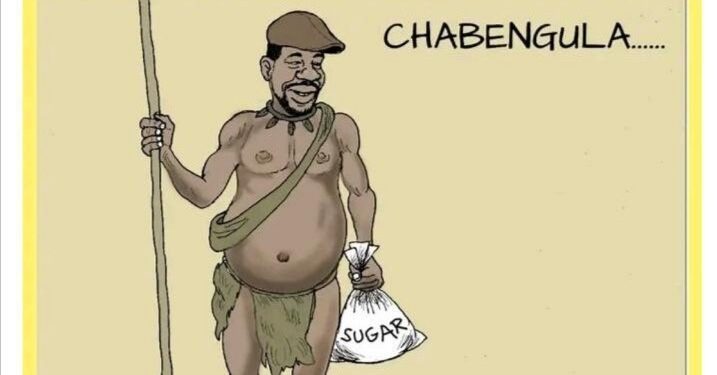Zimbabweans have expressed outrage over a satirical cartoon depicting Sengezo Tshabangu as King Lobengula.
This has been widely viewed as tribalist and disrespectful of the historical figure of the Ndebele king.
many believe that such misrepresentation of historical facts is misleading as many believe that King Lobengula traded vast tracts of land for a sack of sugar.
Here are some reactions from Zimbabweans;
Journalist Hopewell Chin’ono labelled this as irresponsible journalism;
Power without Responsibility!
Whilst freedom of expression is one of the cornerstones of journalism, it shouldn’t be used to perpetuate historical lies and myths.
Tshabangu is a fraud, but dragging King Lobengula into Tshabangu’s treachery and perpetuating a tribal lie that King Lobengula sold the country in exchange for sugar is irresponsible journalism and it is hurtful!
Balancing freedom of expression with ethical reporting helps us as journalists to maintain trust and integrity in the dissemination of information on the communities that we save.
This cartoon is irresponsible journalism and its authors should apologise unreservedly!
Kudzai Mutisi said;
Chamisa & his supporters are just a HATE GROUP, nothing else…
From hating Mudzuri & Khupe, they jumped onto Mwonzora & now they are on Tshabangu.
Their discourse is entirely INSULTS & crude trolling.
No ideas, no ideology, no policies – just a bunch of online trolls
Sandile Makheba retorted;
There is no way King Lobengula would sell the country for sugar when honey has always been there since the Stone Age.
Wes Beal examined:
Tshabangu exploited a legitimate grievance among some in the Ndebele community, and some in the Shona community hate the Ndebele community for it.
The problem with that cartoon isn’t (only) that it was published. The problem is how much it mirrors many Shona people’s thoughts.
Zimbabweans react to Chabengula cartoon
Many Zimbabweans have expressed outrage at the cartoon stating that it was very tribalist as it painted a wrong image. Moreso, they have not issued an apology since.
Many concession-seekers had petitioned Mzilikazi and Lobengula over the years for the right to mine gold in Mashonaland. Rhodes went further and saw gaining a concession as the first step to obtaining a royal charter from the British Government for the British South Africa Company which Rhodes would use as a vehicle to acquire Zambesia, the name of the area between the Limpopo and Zambesi rivers in the 1880’s.
He sent Charles Rudd, a close business associate with Francis Thompson and Rochfort Maguire to Gubulawayo to negotiate with Lobengula and his council of izinDuna. There was fierce competition from other concession seekers at Umvutcha, Lobengula’s kraal, with the main opposition being the London Syndicate, whose local agent was Edward Maund. [The only photo found of Maund is in the article Why Lobengula sent envoys to Queen Victoria in the late nineteenth century under Bulawayo on the website www.zimfieldguide.com]
Very soon after the Rudd concession was signed rumours swirled that the country had been sold and Lobengula realised that the oral promises made by Rudd were not enforceable: “that they would not bring more than ten white men to work in his country, that they would not dig anywhere near towns, etc., and that they and their people would abide by the laws of his country and in fact be his people.”
Lobengula’s efforts to persuade the colonial office that the concession was invalid by sending envoys to Queen Victoria and writing letters to the colonial office was destined to fail as all the key officials in southern Africa, namely Sir Hercules Robinson the high commissioner succeeded in June 1889 by Sir Henry Loch, Sidney Shippard, then resident commissioner of the Bechuanaland protectorate and his deputy John Moffat who were all in favour of Rhodes and the British South Africa Company. (BSACo)
Source HarareLive









